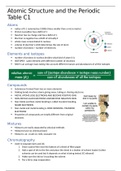Summary
Summary C1 Atomic Structure and the Periodic Table
- Institution
- Esher College, Thames Ditton (Esher)
A complete summarised group of documents complete for GCSE Chemistry AQA 9-1. To make these Summaries I used 3 sources: The CGP revision guide, My GCSE Science Videos and Free science lessons videos. I achieved a 9 in GCSE AQA Triple Chemistry.
[Show more]



